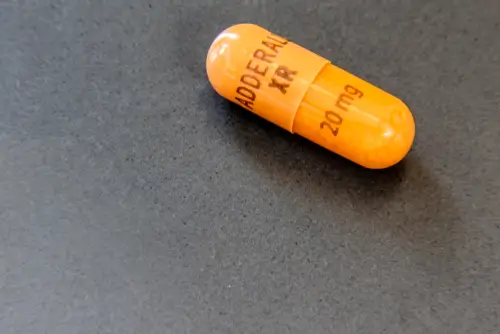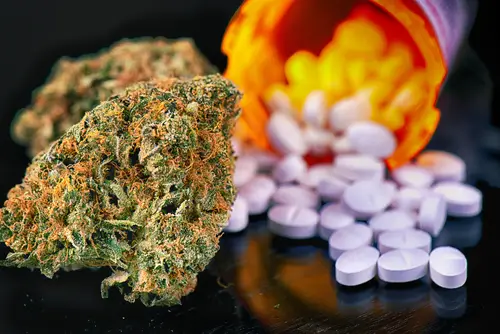In today’s fast-paced world, many individuals use substances to cope with life’s pressures or enhance their performance. Two commonly abused substances, Adderall and weed (cannabis), have gained popularity for various reasons.
Learn what Adderall and weed are, how they affect the body, the potential consequences of addiction to these substances, and strategies for rehabilitation and recovery.

What is Adderall?
Adderall is a Schedule II prescription medication for attention deficit hyperactivity disorder (ADHD). It contains two active ingredients: amphetamine and dextroamphetamine. These stimulants increase the release of certain neurotransmitters, like dopamine and norepinephrine, which can improve focus, attention, and impulse control in individuals with ADHD.
However, Adderall is sometimes misused for non-medical purposes due to its stimulating effects. People may take it to boost concentration or stay awake for extended periods. When used recreationally, it is often called a “study drug” or “smart pill.”
What is Weed?
Weed, or cannabis, is a plant-based substance known for its psychoactive properties. It contains cannabinoids and delta-9-tetrahydrocannabinol (THC), the main psychoactive compound responsible for the “high” from smoking, vaping, tinctures, or eating edibles.
Cannabis is often used recreationally for its relaxing and mood-altering effects. Some individuals also use it for its medical benefits, including pain relief, help with appetite, and anxiety reduction.
How Adderall and Weed Affect the Body
Both Adderall and weed have distinct effects on the body and mind. While both alter the mind and body, they have differing effects.
Effects of Adderall
- Increased Focus and Alertness: Adderall can enhance concentration and alertness, making it easier for individuals to stay on task.
- Elevated Mood: Some users experience improved mood and heightened motivation while on Adderall.
- Appetite Suppression: One common side effect is decreased appetite, which can lead to weight loss.
- Physical Side Effects: Adderall may cause increased heart rate, elevated blood pressure, and potential insomnia.
- Potential for Abuse: Due to its stimulating effects, Adderall has a high potential for abuse and addiction, especially when taken in higher doses or without a prescription.
Read more: What Does Cocaine Feel Like With ADHD?
Effects of Weed
- Euphoria and Relaxation: Cannabis often induces a sense of euphoria and relaxation, which can reduce stress and anxiety.
- Altered Perception: It can alter sensory perception, changing how users perceive time, colors, and sounds.
- Increased Appetite: Often called the “munchies,” cannabis can stimulate appetite.
- Short-Term Memory Impairment: Cannabis can impair short-term memory and cognitive function while under its influence.
- Potential for Dependence: Although less physically addictive than other substances, cannabis can lead to psychological dependence, with some users experiencing withdrawal symptoms when trying to quit.

The Effects of Addiction to Adderall and Weed
Addiction to Adderall and weed can have serious consequences on your physical and mental health and overall well-being, including:
Adderall Addiction Effects
- Tolerance and Dependency: Individuals may develop a tolerance to amphetamines like Adderall over time, requiring higher doses to achieve the desired effects. This can lead to dependency.
- Physical Health Risks: Chronic use of Adderall increases the risk of cardiovascular problems, high blood pressure, and sleep disturbances.
- Mental Health Implications: Adderall abuse is associated with increased anxiety, paranoia, and even psychotic symptoms in some users.
- Neglected Responsibilities: People addicted to Adderall may neglect their responsibilities, including work, school, and personal relationships.
Weed Addiction Effects
- Impaired Cognitive Function: Chronic cannabis use can impair cognitive function, particularly in memory, attention, and learning.
- Mental Health Challenges: Some individuals who abuse weed may experience increased anxiety, paranoia, or depression.
- Reduced Motivation: Cannabis addiction can lead to a lack of motivation and decreased interest in pursuing personal and professional goals.
- Social Isolation: As addiction progresses, individuals might withdraw from personal responsibilities, social activities, and relationships in favor of cannabis use.
Read more: Do Edibles Make You Age Faster? Long-Term Effects Of Cannabis

Rehabilitation and Recovery from Adderall and Weed
Recovering from addiction to Adderall and weed is a challenging but attainable goal. Here are steps and strategies that can aid in the rehabilitation process:
- Seeking Professional Help: Talk with a healthcare professional or addiction specialist for guidance on the best approach to recovery. They’ll help create a personalized treatment plan based on your needs and goals.
- Detoxification: Depending on the addiction severity, detoxification may be necessary to manage withdrawal symptoms safely. Medical supervision is often recommended during this phase.
- Therapy and Counseling: Behavioral therapies, such as cognitive-behavioral therapy (CBT) and motivational interviewing, can focus on and address the underlying causes of addiction and develop healthy coping strategies.
- Support Groups: Joining support groups or attending 12-step programs like Narcotics Anonymous (NA) or Marijuana Anonymous (MA) can provide a sense of community and encouragement during recovery.
- Lifestyle Changes: Switching to a healthier lifestyle involving exercise, adequate nutrition, and stress management skills can help individuals in recovery rebuild their physical and mental well-being.
- Relapse Prevention: Learning to identify triggers and develop strategies to avoid relapse is crucial to long-term recovery.
- Medication-Assisted Treatment (MAT): In some cases, medications may be prescribed as part of a comprehensive treatment plan to manage cravings and withdrawal symptoms.
Launch Centers Can Help with Adderall and Weed Addiction
Understanding the effects of Adderall and weed, as well as the potential consequences of addiction to these substances, is vital for individuals seeking to make informed choices about their use. Addiction to either substance can have profound physical, psychological, and social consequences. However, with the right support, treatment, and determination, individuals can successfully rehabilitate and embark on a healthier, substance-free life.
If you or someone you know is struggling with addiction, Launch Centers is here to help. We understand the effects of addiction to Adderall and weed – and we can help with the rehabilitative therapies, coping mechanisms, and treatment necessary to help pursue a brighter tomorrow. Call us today to learn more about our Adderall and weed programs.





